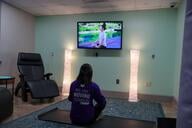You have /5 articles left.
Sign up for a free account or log in.
Donald Trump’s use of the phrase "Chinese virus" and the many reports of racism faced by Asian Americans during the COVID-19 pandemic call to mind the many ugly moments from American history when minorities were scapegoated during a time of crisis.
But history also gives us reason for hope that a crisis can make us more inclusive. The way the World War II era helped us move past the idea of America as a narrowly Protestant nation and brought us to our current Judeo-Christian ideal is one such story.
The United States has long been marked by religious prejudice, despite the architecture of religious freedom and interfaith welcome created by our founders. Jews, Catholics, Muslims, Sikhs, atheists and others faced bigotry from organized forces ranging from the KKK to the United States Congress. American presidents long before Donald Trump openly exhibited prejudice. Franklin Roosevelt was quoted as saying that the United States was “a Protestant country” and “the Jews and Catholics are here under sufferance.”
But the national crisis of World War II changed that, at least for some communities. As the social historian Kevin Schultz highlights in his excellent book TriFaith America, there were so many obvious contributions by Jews and Catholics, and such desperate need for cooperation between diverse groups, that a narrative wider than Protestant nation was required.
"Judeo-Christian" was the phrase that came into favor. The term is not especially theologically useful; Jesus is at the center of the faith lives of Christians but not of Jews. Nor is it particularly historically accurate. Catholics and Protestants have a long history of conflict in Europe, and Jews have generally not fared well as minorities anywhere Christians ruled.
Instead, Judeo-Christian is that most American of things: a genius civic story invented to meet the needs of the moment.
It was the ultimate sacrifice that provided the most powerful symbol of the emerging Judeo-Christian story. In February 1943, a torpedo from a German U-boat hit the USS Dorchester. The four chaplains aboard -- a Catholic, a Jew and two Protestants -- handed out life jackets to the frightened sailors. When there were none left, the men removed the vests from their own bodies and gave them away. Witnesses saw the four arm in arm, each whispering their final prayers according to their respective traditions, going down with the ship.
Various parts of American society did their part to center the Four Chaplains' (always capitalized out of respect) story into the national narrative. The government honored the men with posthumous medals. Warner Brothers made a film called Four Men of God.
The most poignant role might have been played by Daniel Poling, the father of one of the Protestant chaplains who died a hero on the Dorchester. Poling was a well-known conservative Protestant, part of a broader community generally hostile to Catholics in the middle of the 20th century. But after losing his son, Poling underwent something of a change of heart. He wrote a letter in the Congressional Record telling of the comforting visit that he received from a Catholic priest the night the Dorchester sank, further adding, “Where the boy was going and where he is now, there are no schisms or divisions …”
I run an organization called Interfaith Youth Core, which partners with college campuses to be laboratories of interfaith cooperation and launching pads for interfaith leaders. Our alums -- like front-line workers everywhere -- have been working feverishly to meet the overwhelming need of this time.
But it’s the doctors and nurses I’ve been hearing from who most remind me of the Four Chaplains on the Dorchester. One of our alums, Aamir Hussein, is a resident at Long Island Jewish Medical Center. He told me, “There are people from at least seven faith or philosophical worldviews in our group. All of us are relying on our individual traditions to give us strength. And we are relying on each other. This is interfaith cooperation that’s saving lives.”
The United States is, by some measures, the most religiously diverse nation in human history, with meaningful communities of everyone from atheists to Zoroastrians. A previous crisis helped us recognize that we needed to welcome the contributions of the new religious communities of that era.
It is high time that the American story caught up to our current reality. Virtually every hospital in the United States is staffed by teams of medical professionals from a range of different religions, cooperating together to save lives and doing so at great risk to themselves.
"Judeo-Christian" did good work for many decades, but we have moved beyond it. We should embrace being interfaith America.





